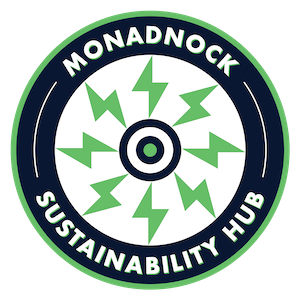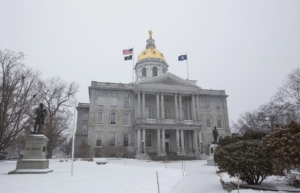By Patricia Beffa-Negrini, Ph.D., retired Registered Dietitian/Nutritionist and member of Monadnock Sustainability Hub’s Board of Directors.
Originally published in The Monadnock Shopper News, Green Monadnock column, January, 2024
With the focus on New Hampshire’s “First in the Nation” Primary, you might forget that New Hampshire’s state legislative session began this month, too. The session will run through June and you can have an impact — it’s not difficult to have your voice heard once you know the ropes.
While living in other New England states, I did not bump into citizens with much interest in legislation. But moving to NH, I met people with politics almost as a hobby. Recently, I’ve joined in by learning how to keep track of what’s going on at the state level and you can, too.
New Hampshire has one of the largest legislative bodies in the United States. Thus, your state senators and representatives are your neighbors. They work for you and must keep up with hundreds of bills and issues. This is where you come in. If you know about and care deeply about a topic, legislators welcome your input, particularly if you are a constituent and voter. To find contact information go to https://gencourt.state.nh.us/Senate/members/senate_roster.aspx for your NH State Senator and https://gencourt.state.nh.us/house/members/default.aspx for your NH State Representatives. Don’t hesitate to reach out with your questions, concerns, or viewpoints about issues and bills.
In NH, every bill must have a hearing, a committee vote, and a floor vote. Here are times in the legislative process when you can have an impact:
- Committee hearings are the only time when public sign-ins and testimony are taken and a critical point to reach legislators to help them gauge public opinion. Individuals can sign in remotely (or same-day in person) to register support or opposition to a bill. You can also testify either in person or in writing.
- Executive sessions occur after a hearing where every bill gets a vote in committee. Committees recommend OTP (ought to pass, sometimes with amendment); ITL (inexpedient to legislate); or that the bill be retained for further study (usually a subtle way to kill a bill). The best way to influence executive session votes is by contacting committee members ahead of time, which is especially helpful if your representative or senator sits on the committee.
- Session floor votes are scheduled during House or Senate sessions once a committee makes its recommendation on a bill. This is the time to contact YOUR representatives or senator urging them to support or oppose a bill.
Now that you know more about the process, take action. First, choose bills to follow. It can be a bit overwhelming because with so many NH legislators there can be many bills to sort through. One way I find bills is through organizations I support. The New Hampshire Network for Environment, Energy, and Climate has working groups that focus on specific bills, which are listed in a table on their NH Bill Action page: newhampshirenetwork.org/NH-bills. Another way is to check emails from groups you follow and see if they recommend bills to support, oppose, or monitor. You can also search for and subscribe to current bills at gencourt.state.nh.us.
A helpful tool is LegiScan (legiscan.com). You can follow 50 bills with a free account. I searched LegiScan for a bill on EPR (Extended Producer Responsibility) and found HB1630, which “… incentivizes reduction of toxins and waste flow at the source, and provides relief to municipal waste disposal costs.” As a member of Clean Energy NH (cleanenergynh.org), I learned of SB320, which could help NH proactively plan for heating and transportation systems to run on electricity; and from the Carbon Cash-back Coalition (carboncashback.org) HB1486 “relative to proxy carbon pricing in state procurement.” I added the bills to my LegiScan account and as the bills move forward notifications will come to me by email on Monday mornings. Then I’ll go to the NH Bill Action page (web address above) and follow directions to weigh in.
Politics can be aggravating and discouraging. Taking action instead of giving up can feel empowering. Speak up and be a part of the process to address extreme weather, promote local clean energy policy, and protect our community.
Patricia Beffa-Negrini, Ph.D., lives in Nelson, NH, and is a retired Registered Dietitian/Nutritionist. She maintains websites for the NH Network for Environment, Energy, and Climate and their Plastics Working Group’s Ten Towns Ten Actions Toolkit to rethink plastics. She is a Board member of the Monadnock Sustainability Hub, a NH nonprofit whose purpose is to cut emissions from our region and thus address carbon pollution. Her email is nelsoncommunitypower@gmail.com.

